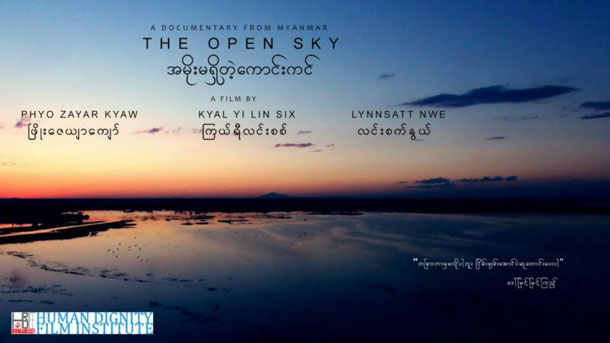Phyo Zayar Kyaw, 28, is one of the three filmmakers who made “The Open Sky,” a 20-minute documentary shot in Meikthila, a town in central Burma that witnessed horrendous, deadly clashes between Buddhists and Muslims in March 2013.
The film was supposed to be screened at the Human Rights Human Dignity International Film Festival in Rangoon on June 15-19, but was cancelled after criticism on social media from Burmese Buddhists, who claimed that it was too sympathetic to the predicament of Muslims. It was one of five films produced by students of Rangoon’s Human Dignity Film Institute.
The film follows the life of a Muslim woman whose house was burned down during the anti-Muslim violence, but who refuses to leave Meikthila as she considers it her home. A Buddhist friend helps the woman during the conflict and the documentary shows their views of the conflict, and of each other.
Phyo Zayar Kyaw spoke to The Irrawaddy about the film’s cancellation, the idea behind the documentary and the challenges he faced during its production.
Question: How do you feel about your film being cancelled at the human rights film festival?
Answer: We received warnings before the film festival that the film might be cancelled due to surging online social media hate speech, in fact, as I’ve said before, my partners and I are fully aware that this is a controversial topic. The final decision to cancel this film was made due to the organizers’ fears that because of the sensitive state that the country is currently in, the screening of this film may generate unwanted conflict during the film festival.
The film festival is a great celebration of human rights, the first of its kind in Myanmar, which features 32 films produced by Burmese filmmakers and over 20 international films produced by different filmmakers from all over the world. There is so much hard work and labor involved in this film festival that it is unfair to everyone else involved if things go wrong just because of our film.
Q: What message did you want to convey through this film?
A: I think the main message we wanted to convey through this film is that nobody wants conflict. We wanted to portray and showcase the raw and human emotions of those who are inhabitants of conflict zones. It’s ironic [that the film was cancelled] because we actually wanted to deter anger that people have towards each other and become more understanding of one another through this film.
It was meticulously designed to help people sympathize with one another, to make people watch someone else cry and empathize with their emotions and realize that nobody wants conflict, nobody gets out of a conflict without losses and suffering. That was what our film was aimed to do but now due to the outburst of social media hate speech, the film hasn’t been screened anywhere yet. I believe that if the film was screened as planned, it would generate responses opposite to what we’ve seen now.
Q: What were some difficulties that you and other filmmakers faced in the production of the film?
A: We knew from the start that the topic of this project, which is growing religious tensions in Myanmar, is a controversial one that can potentially spark conflict. When we went to do the filming of the documentary in Meikthila, there were many people who were suspicious. Or let’s just say curious, about what we were filming and why.
In the editing process of this film, we were extremely careful about including scenes that have the slightest potential of inciting anger in people and we ended up deleting many parts of the film that we actually liked. In our decision-making about various aspects of the film, we couldn’t prioritize the quality of the storyline but, instead, had to place more emphasis on the balance and objectivity of our portrayal of the religious conflict.
Q: There are many who have criticized the film through social media, what would you like to say to them?
A: Frankly, I don’t have much to say to them. From the time when the idea for this film was conceived we were very aware that the topic is extremely controversial, and thus we were very careful not to incite anger. To those who are criticizing this film without having even watched it, I really have nothing to say.
















